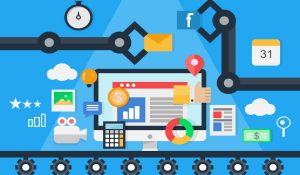
In the ever-evolving world of B2B demand generation, harnessing the power of automation is paramount. B2B marketing automation brings a transformative edge, allowing businesses to streamline processes, enhance efficiency, augment sales, generate personalized campaigns, obtain better B2B lead generation, and drive targeted engagements.
Let’s start with a glimpse of what B2B marketing automation is, and then explore its working, importance, distinction from CRM, and other insights.
What is B2B Marketing Automation?
Marketing automation involves the automated processes and systems companies can use to streamline various marketing activities. It involves leveraging software platforms and tools to streamline repetitive tasks, nurture leads, and personalize customer interactions at scale. A suitable marketing automation platform relies on several parameters, such as organizational size, market initiatives, and the consumer journey to be implemented.
By automating B2B email campaigns, lead scoring, and data analysis, B2B marketing automation enables companies to save time, improve efficiency, and deliver targeted experiences to their prospects and customers.
The significance and utmost requirement of marketing automation is discussed further.
Why is B2B Marketing Automation Important?
The businesses must sustain a concrete brand value over all the sales channels. Marketing automation mainly helps to quickly comprehend the chances of new lead conversion and the efforts to spend on existing leads. This is a function of activity tracking, lead scoring, and B2B customer segmentation.
Marketing automation can streamline repetitive tasks, such as sending and scheduling automated emails. It simplifies the retargeting of ad campaigns and sales outreach on social media. It helps to create a list of targeted leads instead of assigning them as new clients after being secured. Moreover, it notifies the team about significant events such as new leads, customer concerns, brand mentions on social media platforms, and more.
B2B marketing automation solutions are essential as they enable you to coordinate various channels and campaigns from one platform, offering you a uniform view of entire marketing activities.
The commencing of marketing automation can be traced back to the early digital stage. Let’s navigate through the beginning and later stages of development.
When Did B2B Marketing Automation Start?
Though marketing practices commenced way earlier, the importance of automating marketing efforts was realized much later. One of the earliest enterprises in the domain was started in 1992. It offered several marketing management tools that helped businesses reach digital-age customers.
For the next few years after this, many organizations were observed adopting the technology, leading to the widespread growth of the marketing automation industry. Hand in hand grew the demand for the best B2B marketing automation technology. Around 2007, several software solutions emerged with intuitive and user-friendly features that enabled businesses to customer segmentation, lead scoring, and subscriber communication.
These days, marketing automation is way more accessible than earlier. Various services offer businesses to launch appropriate marketing initiatives such as social media funnels, drip campaigns, etc.
Now that we have delved into the origins of B2B marketing automation, let’s dive into its functioning and uncover how this transformative approach operates.
How Does B2B Marketing Automation Work?
The functionality of marketing automation largely relies on the tool used and the associated campaign that the business is running. The marketing automation platform primarily offers a code section to be placed at the website’s back end. This enables the marketing automation platform to keep track of every visitor who comes to the site.
The action, behavior, traffic source, and other details of the visitor are tracked separately and delivered to the business. The marketing automation platform receives this data to assess individual visitors’ actions. By voluntarily organizing segments or B2B email lists, all the visitors can be categorized into broader groups based on their actions, engagement patterns, and locations.
The platform also triggers automatic actions when a lead or visitor meets particular conditions. These actions involve sent emails, website design changes, retargeting ads, and more.
After understanding the working, let’s dive into comprehending various types of marketing automation to assess the compatibility of the suitable option with your business requirements.
Different Types of Marketing Automation
Various types of software programs coordinate several external and internal marketing functions. You can simplify a lot of complex tasks with the integration of automated marketing. This largely depends on the marketing stack your organization chooses to propagate with.
1) Customer Relationship Management (CRM) Automation
CRM has been one of the significant features in automation marketing. A CRM program stores user data in a convenient dashboard from where the marketing personnel can immediately access the relevant data, including contacts, email addresses, locations, and other demographic information.
Besides, checking the specific lead’s position down the sales funnel is also feasible. With the help of these insights, marketers can release relevant marketing content to direct the concerned leads to conversion.
CRM automation enables members to communicate through reminders and social notes. Social notes channel in-house communication and facilitate to sharing of product insights with customers. Attaching reminders to leads helps the marketing team to keep track and follow up.
2) Landing Page Automation
With suitable marketing automation software, it becomes simpler to automate landing pages. These pages are crucial to accomplishing maximum conversion rates. Your official site is considered poorly optimized if it does not have the necessary landing pages according to the organization’s apex buyer personas.
With the help of the right B2B marketing automation software, your marketing team can generate the most engaging landing pages in the minimum possible time. No dire need for coding is a major advantage involved. Even with a mere point-and-click editor, a pre-designed layout can be selected and customized with text, images, CTA, and other content.
A decent landing page generator can build a sales funnel for guiding B2B sales-qualified leads to purchase. Moreover, marketers can thoroughly monitor the leads down the sales funnel to manage their digital marketing strategies.
3) Email Automation
B2B Email automation influences overall marketing efforts. It enables email campaigns to be released based on responses. Besides, it reduces many repetitive actions and facilitates a streamlined workflow.
A standard email automation app has a designing platform stacked with templates that the marketing team can flexibly customize. Without any requirement for coding skills or graphics, the creative team can create dynamic emails with the help of just a point-and-click feature to edit all elements.
Team members, who are skilled at generating emails from scratch, can customize designs in HTML. Once the customized email campaign is set, the team can initiate triggers to send emails. Any new lead that creates an account for receiving notifications can get a welcome email.
4) Web Form Automation
Website optimization for conversion has been a crucial segment of marketers’ tasks. Interactive web forms are essential to lead visitors to some concrete action. Web form automation somehow resembles the landing page generator.
The creative team can create various dynamic web forms in the minimum feasible time. Even the pre-designed web form templates can be personalized to match the brand’s aesthetics. You can customize data fields to generate multiple data points.
Data garnered through web forms can augment customer service, products, and buyer personas. A suitable web form generator enables reporting, analytics, and third-party app integrations.
5) Social Media Automation
Social media marketing automation keeps the team occupied with brainstorming and dynamic content for the company’s social media accounts rather than spending efforts on monotonous tasks.
It involves properly scheduling and publishing the content, tracking, conversations, and cross-channel posting. FAQs can be integrated into the chatbots to interact with customer concerns. Even social media automation can help you keep track of site visitors who made it to your site through social media accounts.
Marketing teams can create engaging content for followers that can increase the chances of conversion. With some effort, the company can recognize its major brand advocates over social media channels.
6) Blog Automation
Blog automation makes generating and managing blogs easier, though it cannot directly generate content. Moreover, using a blog builder requires no coding skills. An engaging blog can be created by marketing personnel in minimum time with instant customization options of text, images, and CTAs.
Every time new content is posted, the subscriber will receive an automated mail with the notification of the new blog. With associated analytics, it’ll be easier to check how well the articles are performing, and accordingly, the content strategy can be adjusted.
7) Marketing Analytics Automation
This is a function of reporting and analytics. It makes it easier for the marketing team to gain results and statistics without spending a long time navigating through multiple data points. Automation enables you to monitor campaigns involving social media, email, ads, blogs, and other content. For blogs, advertisements, and social media, the campaigning performance can be checked, and the data can be used to enhance B2B demand generation campaigns.
The following segment unfolds how marketing automation stands distinct from regular CRM concerning certain key parameters.
Remarkable Distinctions Between Marketing Automation and CRM
The key parameters that work vividly with respect to marketing automation and CRM are discussed as follows. The comparative analysis helps comprehend the merits of automation over CRM.
| Marketing Automation | CRM |
|---|---|
| It becomes self-regulated after receiving manual instructional input. | It relies on human input to get functional. |
| B2B marketing automation tools have built-in features to enable and coordinate communication, campaigns, and customer relationships. | CRM alone cannot automate the campaign and communication. |
| It is more workflow-oriented that works on analytical queries and behavioral data. | It is database-oriented and works on transactional queries. |
| Primarily emphasizes marketing management with little sales coordination. | The primary emphasis is on sales management with little marketing coordination. |
| It caters to the needs of marketing representatives. | It serves the requirements of sales personnel. |
| It enhances sales and marketing workflows. | It improves sales performance. |
After understanding the difference between automation and CRM, the next segment will discuss the criteria that form the basis for selecting the best B2B marketing automation tools to fit your business requirements.
How Do You Choose B2B Marketing Automation Software?
Selecting a suitable marketing automation platform is mandatory to ensure the success of the sales and marketing teams’ efforts. Following are some of the criteria that can form the determining base for your marketing automation platform:
1) Functions and Features: Various aspects need to be evaluated here, such as the compatibility of the automation platform with your marketing channel; its ability to execute ad campaigns and social media automation; and its functionality for B2B lead generation solutions companies.
2) Personalizing User Experience: The automation platform must be flexible to meet your needs. It should offer a personalized and dynamic user experience essential in the B2B domain.
3) Customer Support: An assistive customer support team must remain available 24/7 if any hurdle or roadblock is encountered. The team must be equipped with a compilation of self-support resources to tackle complexities.
4) Analytics System: Data collection and analysis must be flexible enough to coordinate the campaign.
Conclusion
The best B2B demand generation solution companies leverage marketing automation to transform audience engagement, streamline operations, and fuel revenue growth. However, companies should ensure that their marketing solutions work best for their purpose.
With the assistance of Binary Demand’s lead generation services, companies can leverage the power of automation to streamline their marketing efforts, nurture leads effectively, and achieve tangible results.


